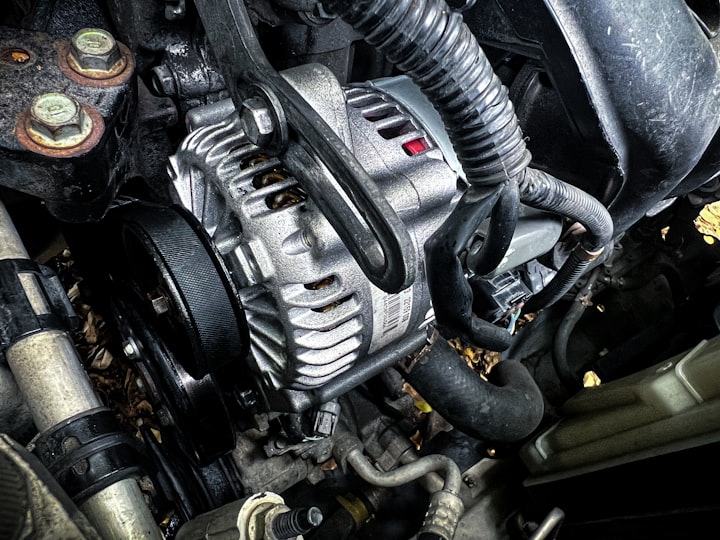How Long Will a Car Run with a Bad Alternator?
How Long Can Your Car Run with a Bad Alternator? Find Out the Truth!

When it comes to car troubles, a bad alternator is something you don't want to ignore. The alternator plays a crucial role in keeping your car's electrical system functioning properly, including charging the battery while the engine is running. If you suspect that your alternator is failing, you may be wondering how long your car can keep going before it finally gives up. In this article, we'll delve into the various factors that can affect the lifespan of a car with a bad alternator, along with the warning signs to watch out for.
Signs of a Bad Alternator
Before we delve into the question of how long a car can run with a bad alternator, let's first familiarize ourselves with the warning signs of alternator failure. Recognizing these signs early on can help you avoid getting stranded on the side of the road:
- Dimming headlights: If your headlights are noticeably dimmer than usual, especially when you're idling or at low speeds, it could be an indication of a failing alternator.
- Flickering dashboard lights: Pay attention to any unusual flickering or dimming of the dashboard lights, including the battery warning light. This could be a sign that the alternator is not producing enough power.
- Strange noises: A failing alternator may produce unusual noises, such as a whining or grinding sound. These noises should never be ignored and warrant immediate attention.
- Electrical issues: An alternator problem can cause various electrical malfunctions, such as power windows operating slowly, radio cutting in and out, or issues with the air conditioning system.
- Weak or dead battery: If your car struggles to start or the battery dies frequently, it may be due to a faulty alternator not properly charging the battery while the engine is running.
Now that we know the warning signs, let's explore how long a car can keep running with a bad alternator.
Factors Affecting the Lifespan of a Car with a Bad Alternator
Several factors come into play when determining how long a car can run with a bad alternator. It's important to note that these factors are not definitive, as each vehicle's situation may differ. However, considering these factors can give you a general idea of what to expect:
1. Battery Health
The health and charge level of your car's battery before the alternator failure can significantly impact how long your car will continue to run. A healthy, fully charged battery can provide some power for a limited time, but it will eventually drain and leave you stranded.
2. Power Demand
The electrical demands of your vehicle also play a role in determining the car's running time with a bad alternator. Vehicles with minimal electrical features and accessories may run longer than those with high power demands.
3. Driving Conditions
The driving conditions you encounter can affect the lifespan of your car with a bad alternator. For instance, highway driving with a fully charged battery may allow the vehicle to run longer due to less stop-and-go traffic, while city driving with frequent stops can drain the battery quickly.
4. Alternator Failure Severity
The extent of the alternator failure can impact how long your car can run. If the alternator completely stops charging the battery, the car will rely solely on the battery's remaining charge, resulting in a shorter running time.
5. Electrical Load Management
Modern vehicles often have sophisticated electrical load management systems that prioritize power distribution. These systems may prolong the running time by reducing power to non-essential components and focusing on vital functions.
Frequently Asked Questions

1. How do I know if my alternator is failing?
Some common signs of a failing alternator include dimming headlights, flickering dashboard lights, strange noises, electrical issues, and a weak or dead battery. If you experience any of these symptoms, it's essential to have your alternator inspected by a professional mechanic.
2. Can I drive with a bad alternator?
While it is possible to drive with a bad alternator for a short distance, it is not recommended. Continued driving with a faulty alternator can result in a dead battery, loss of power to essential systems, and ultimately, a stranded vehicle.
3. How long can a car run on battery power alone?
The running time of a car on battery power alone depends on various factors, including the battery's health, charge level, and power demand of the vehicle. Generally, a fully charged battery can provide enough power for around 30 minutes to an hour.
4. Will jump-starting the car allow me to keep driving?
Jump-starting your car using another vehicle's battery or a portable jump starter can provide temporary power to the electrical systems. However, if the alternator is not charging the battery, the power will eventually drain, and the car will stall again.
5. Can I replace the alternator myself?
Replacing an alternator can be a complex task, as it involves working with electrical components and belt systems. It is recommended to have a professional mechanic perform the alternator replacement to ensure proper installation and avoid further damage.
6. How much does it cost to replace an alternator?
The cost of alternator replacement can vary depending on the make and model of your vehicle and the labor rates in your area. On average, the cost ranges from $300 to $700, including parts and labor.
7. Can a bad alternator damage my car's battery?
Yes, a bad alternator can damage your car's battery. If the alternator is not charging the battery properly, it can lead to overworking the battery and causing premature failure.
8. What should I do if my car's alternator fails?
If you suspect your car's alternator has failed, it is recommended to stop driving and have the vehicle towed to a professional mechanic. Attempting to drive with a bad alternator can cause further damage to the electrical system and leave you stranded.
9. How often do alternators fail?
The lifespan of an alternator can vary depending on various factors, such as the vehicle's make and model, driving conditions, and maintenance. On average, alternators can last between 80,000 to 150,000 miles (128,000 to 241,000 kilometers) or more.
10. Can I prevent alternator failure?
While you can't guarantee prevention, regular vehicle maintenance can help reduce the risk of alternator failure. Regularly checking the battery's health, keeping the connections clean and tight, and addressing electrical issues promptly can contribute to a longer alternator lifespan.
11. What other components can be affected by a bad alternator?
A bad alternator can have a domino effect on other electrical components, such as the voltage regulator, ignition system, fuel injection system, and various sensors. Addressing alternator issues promptly can help prevent further damage to these components.
12. Can a bad alternator cause the engine to stall?
Yes, a bad alternator can cause the engine to stall if the battery drains completely. Without a sufficient power supply, essential systems like the ignition and fuel injection may fail, resulting in engine stalling.
13. Can I drive my car with a failed alternator if I disconnect the battery?
No, disconnecting the battery will not solve the problem of a failed alternator. The battery will provide temporary power, but without the alternator charging it, the car's electrical systems will eventually drain the battery, causing the vehicle to stall.
In conclusion, the running time of a car with a bad alternator can vary depending on factors such as battery health, power demand, driving conditions, alternator failure severity, and electrical load management. While it may be possible to drive for a short distance with a failing alternator, it is not advisable as it can lead to a dead battery and loss of essential systems. If you suspect alternator trouble, it is best to have your vehicle inspected by a professional mechanic to diagnose the issue accurately and perform necessary repairs. Remember, proactive maintenance and prompt attention to warning signs can help you avoid the inconvenience and potential hazards associated with a bad alternator.
Disclaimer
The topic of this article, "How Long Will a Car Run with a Bad Alternator," has been extensively researched to provide accurate and reliable information to readers. The content is based on general knowledge and does not take into account specific circumstances or individual vehicle conditions. It is always recommended to consult with a professional mechanic for a thorough diagnosis and appropriate repairs.
About the Creator
CityStateInfo (New Media)
I am an ambitious and creative content creator passionate about engaging content that resonates with audiences.
My work is driven by my belief in the power of storytelling to educate and inform people about important topics.





Comments
There are no comments for this story
Be the first to respond and start the conversation.